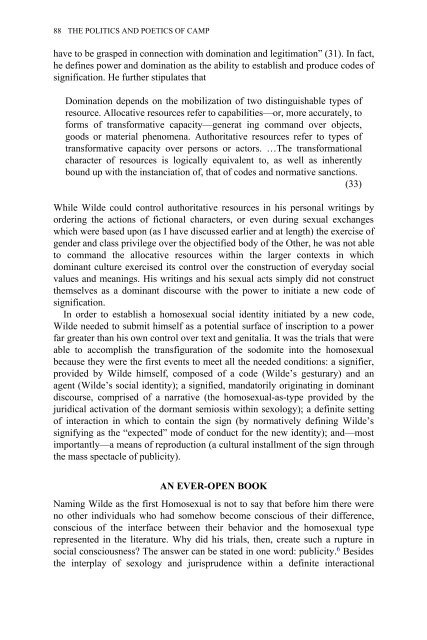Edited by Moe Meyer - Get a Free Blog
Edited by Moe Meyer - Get a Free Blog
Edited by Moe Meyer - Get a Free Blog
You also want an ePaper? Increase the reach of your titles
YUMPU automatically turns print PDFs into web optimized ePapers that Google loves.
88 THE POLITICS AND POETICS OF CAMP<br />
have to be grasped in connection with domination and legitimation” (31). In fact,<br />
he defines power and domination as the ability to establish and produce codes of<br />
signification. He further stipulates that<br />
Domination depends on the mobilization of two distinguishable types of<br />
resource. Allocative resources refer to capabilities—or, more accurately, to<br />
forms of transformative capacity—generat ing command over objects,<br />
goods or material phenomena. Authoritative resources refer to types of<br />
transformative capacity over persons or actors. …The transformational<br />
character of resources is logically equivalent to, as well as inherently<br />
bound up with the instanciation of, that of codes and normative sanctions.<br />
(33)<br />
While Wilde could control authoritative resources in his personal writings <strong>by</strong><br />
ordering the actions of fictional characters, or even during sexual exchanges<br />
which were based upon (as I have discussed earlier and at length) the exercise of<br />
gender and class privilege over the objectified body of the Other, he was not able<br />
to command the allocative resources within the larger contexts in which<br />
dominant culture exercised its control over the construction of everyday social<br />
values and meanings. His writings and his sexual acts simply did not construct<br />
themselves as a dominant discourse with the power to initiate a new code of<br />
signification.<br />
In order to establish a homosexual social identity initiated <strong>by</strong> a new code,<br />
Wilde needed to submit himself as a potential surface of inscription to a power<br />
far greater than his own control over text and genitalia. It was the trials that were<br />
able to accomplish the transfiguration of the sodomite into the homosexual<br />
because they were the first events to meet all the needed conditions: a signifier,<br />
provided <strong>by</strong> Wilde himself, composed of a code (Wilde’s gesturary) and an<br />
agent (Wilde’s social identity); a signified, mandatorily originating in dominant<br />
discourse, comprised of a narrative (the homosexual-as-type provided <strong>by</strong> the<br />
juridical activation of the dormant semiosis within sexology); a definite setting<br />
of interaction in which to contain the sign (<strong>by</strong> normatively defining Wilde’s<br />
signifying as the “expected” mode of conduct for the new identity); and—most<br />
importantly—a means of reproduction (a cultural installment of the sign through<br />
the mass spectacle of publicity).<br />
AN EVER-OPEN BOOK<br />
Naming Wilde as the first Homosexual is not to say that before him there were<br />
no other individuals who had somehow become conscious of their difference,<br />
conscious of the interface between their behavior and the homosexual type<br />
represented in the literature. Why did his trials, then, create such a rupture in<br />
social consciousness? The answer can be stated in one word: publicity. 6 Besides<br />
the interplay of sexology and jurisprudence within a definite interactional


